Related Research Articles

The United Arab Republic was a sovereign state in the Middle East from 1958 until 1961. It was initially a political union between Egypt and Syria from 1958 until Syria seceded from the union following the 1961 Syrian coup d'état. Egypt continued to be known officially as the United Arab Republic until September 1971 when it was formally dissolved by Anwar Sadat.

Gamal Abdel Nasser Hussein was an Egyptian military officer and politician who served as the second president of Egypt from 1954 until his death in 1970. Nasser led the Egyptian revolution of 1952 and introduced far-reaching land reforms the following year. Following a 1954 attempt on his life by a Muslim Brotherhood member, he cracked down on the organization, put President Mohamed Naguib under house arrest and assumed executive office. He was formally elected president in June 1956.

Farouk I was the tenth ruler of Egypt from the Muhammad Ali dynasty and the penultimate King of Egypt and the Sudan, succeeding his father, Fuad I, in 1936 and reigning until his overthrow in a military coup in 1952.
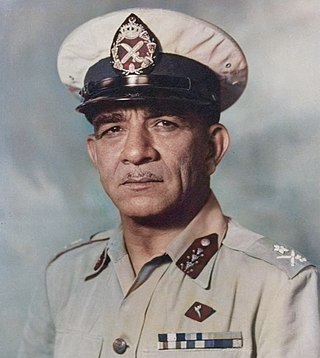
Mohamed Bey Naguib Youssef Qutb El-Qashlan, also known as Mohamed Naguib, was an Egyptian military officer and revolutionary, who along with Gamal Abdel Nasser, was one of the two principal leaders of the Free Officers movement of 1952 that toppled the monarchy of Egypt and the Sudan, leading to the establishment of the Republic of Egypt, and the independence of Sudan, and eventually South Sudan in 2010.

The Free Officers were a group of revolutionary Egyptian nationalist officers in the Egyptian Armed Forces and Sudanese Armed Forces that instigated the Egyptian revolution of 1952. Initially started as a small rebellion military cell under Abdel Moneim Abdel Raouf, which included Gamal Abdel Nasser, Hussein Hamouda, Khaled Mohieddin, Kamal el-Din Hussein, Salah Nasr, Abdel Hakim Amer, and Saad Tawfik, it operated as a clandestine movement of junior officers who were veterans of the Palestine War of 1948-1949 as well as earlier nationalist uprisings in Egypt in the 1940s. The nationally respected war hero Mohamed Naguib joined the Free Officers in 1949. Naguib's hero status, and influence within the army, granted the movement credibility, both within the military and the public at large. He became the official leader of the Free Officers during the turmoil leading up the revolution that toppled King Farouk in 1952. The Movement was succeeded by the Revolutionary Command Council after the overthrow of Farouk that was later succeeded by the Supreme Council of the Armed Forces

Mohamed Abdel Hakim Amer was an Egyptian military officer and politician. Amer served in the 1948 Arab–Israeli War, and played a leading role in the military coup that overthrew King Farouk in 1952. After leading Egyptian forces in the 1956 Suez war, he was appointed Minister for Defense by President Gamal Abdel Nasser and was Egyptian Vice President between 1958 and 1965.
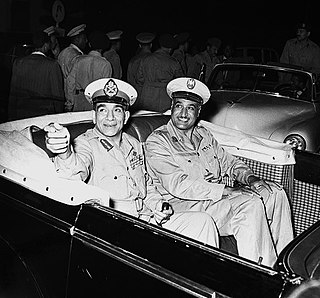
The Egyptian revolution of 1952, also known as the 1952 coup d'état and 23 July Revolution, was a period of profound political, economic, and societal change in Egypt. On 23 July 1952 the revolution began with the toppling of King Farouk in a coup d'état by the Free Officers Movement. This group of army officers was led by Mohamed Naguib and Gamal Abdel Nasser. The Revolution ushered in a wave of revolutionary politics in the Arab World, and contributed to the escalation of decolonisation, and the development of Third World solidarity during the Cold War.

Hussein Sirri Pasha (1894–1960) was an Egyptian politician. He served as 25th Prime Minister of Egypt for three short periods, during which he also served as foreign minister.

The Kingdom of Egypt was the legal form of the Egyptian state during the latter period of the Muhammad Ali dynasty's reign, from the United Kingdom's recognition of Egyptian independence in 1922 until the abolition of the monarchy of Egypt and Sudan in 1953 following the Egyptian Revolution of 1952. Until the Anglo-Egyptian treaty of 1936, the Kingdom was only nominally independent, as the United Kingdom retained control of foreign relations, communications, the military, and Sudan. Officially, Sudan was governed as a condominium of the two states; however, in reality, true power in Sudan lay with the United Kingdom. Between 1936 and 1952, the United Kingdom continued to maintain its military presence, and its political advisers, at a reduced level.

Gamal Salem was an Egyptian military officer and prominent member of the Egyptian Free Officers who led the Egyptian Revolution of 1952 that toppled the monarchy of Egypt and Sudan. Prior to the Revolution, he served as an officer in the Royal Egyptian Air Force.

Abdel Latif Boghdadi or Abd el-Latif el-Baghdadi was an Egyptian politician, senior air force officer, and judge. An original member of the Free Officers Movement which overthrew the monarchy in Egypt in the 1952 Revolution, Boghdadi later served as Gamal Abdel Nasser's vice president. The French author Jean Lacouture called Boghdadi "a robust manager" who only lacked "stature comparable to Nasser's." The two leaders had a falling out over Nasser's increasingly socialist and pro-USSR policies and Boghdadi subsequently withdrew from political life in 1964, although he mended ties with Nasser before the latter's death in 1970.

Salah Salem was an Egyptian military officer and politician who was a prominent member of the Free Officers Movement that orchestrated the Egyptian Revolution of 1952.
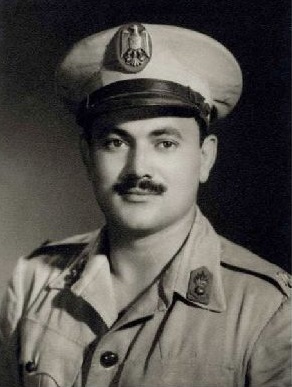
Kamal El-Din Hussein was a member of the Egyptian Free Officers who overthrew King Farouk.

Abdullah Rimawi was the head of the Ba'ath Party in Jordan in the 1950s. He served as Foreign Affairs Minister in Suleiman Nabulsi's government in 1957. A staunch pan-Arabist, Rimawi became one of the most vocal opponents of the Hashemite ruling family in Jordan and favored union with Syria. He fled Jordan in 1957 as the result of a crisis between the leftist government he was a part of and the royal family. He based himself in the United Arab Republic, where he drew closer to UAR President Gamal Abdel Nasser provoking his expulsion from the Ba'ath Party—which was at odds with Nasser—in 1959. Soon after he founded a splinter party called the Arab Socialist Revolutionary Ba'ath Party. During his exile, he allegedly made a number of attempts to attack or undermine the Jordanian monarchy.

The history of Egypt under Gamal Abdel Nasser covers the period of Egyptian history from the Egyptian Revolution of 1952, of which Gamal Abdel Nasser was one of the two principal leaders, spanning Nasser's presidency of Egypt from 1956 to his death in 1970. Nasser's tenure as Egypt's leader heralded a new period of modernisation and socialist reform in Egypt, along with a staunch advocacy of pan-Arab nationalism, and developing world solidarity. His prestige in Egypt and throughout the Arab World soared in the wake of his nationalisation of the Suez Canal Company in 1956, and Egypt's political victory in the subsequent Suez Crisis, but was damaged badly by Israel's victory in the Six-Day War.
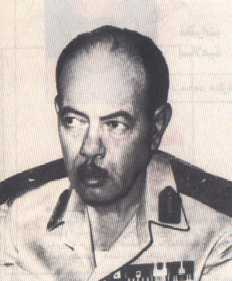
Mohamed Fawzi was an Egyptian general and politician who served as minister of war between 1968 and 1971.

Shaykh Mustafa Abd ar-Raziq was an Egyptian Islamic philosopher.
The Iron Guard of Egypt was a secret pro-Axis society and royalist political movement formed in Egypt in the early 1930s and used by King Farouk for personal and political vendettas. The guard was involved in attacks on Farouk's declared enemies, operating with a license to kill, and is believed to have taken orders from Farouk personally. Its other functions included protecting Farouk, serving as a special operations force, and gathering military intelligence.

The first cabinet formed by Hussein Sirri Pasha was one of the governments during the reign of King Farouk. The cabinet lasted from November 1940 to February 1942. It succeeded the cabinet of Hassan Sabry Pasha who suddenly died on 15 November while delivering a speech on behalf of the King at the opening session of the Chamber of Deputies.
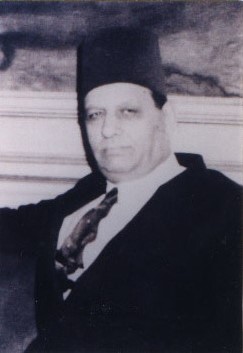
Mohamed Haidar Sayed El Heiny was an Egyptian military officer and politician. Haidar served in the 1948 Arab–Israeli War, and played a leading role in the Egyptian politics before the 1952 Revolution, especially in King Farouk's reign. He was appointed Minister for War by King Farouk. Haidar was also the president of Zamalek SC, he is the longest serving president in the history of the club.